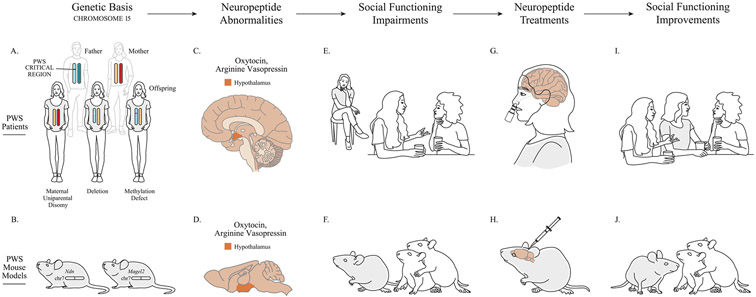Fig. 1.
Hypothalamic neuropeptides and social functioning in Prader-Willi syndrome (PWS). A. PWS is caused by genetic changes within the PWS critical region on chromosome 15 (15q11-q13). The top section of panel A represents an unaffected father (with the PWS critical region indicated on chromosome 15) and an unaffected mother. The bottom section of panel A depicts the specific changes to chromosome 15 that cause PWS in offspring (shaded in gray): maternal uniparental disomy of chromosome 15 (i.e., both copies of chromosome 15 are inherited from the mother), paternal deletion of 15q11-q13, or an imprinting (methylation) defect of paternal 15q11-q13. B. Mice carrying targeted gene mutations of PWS (shaded in gray) in Ndn and Magel2 on chromosome 7 (chr7) recapitulate many core characteristics of PWS. C. and D. Prohormone convertase deficiency (not pictured) is hypothesized to alter precursor processing of the hypothalamic neuropeptides, oxytocin and arginine vasopressin, in both PWS patients and mouse models of PWS. E. and F. The resulting neuropeptide signaling abnormalities, in turn, are associated with social functioning deficits in both PWS patients and mouse models. G. and I. Intranasal oxytocin or carbetocin (an oxytocin analogue) treatment improves social functioning in at least some individuals with PWS. H. and J. Oxytocin or arginine vasopressin administration improves social functioning in mouse models of PWS. (The effect of arginine vasopressin administration on social functioning has not been tested in PWS patients.).

